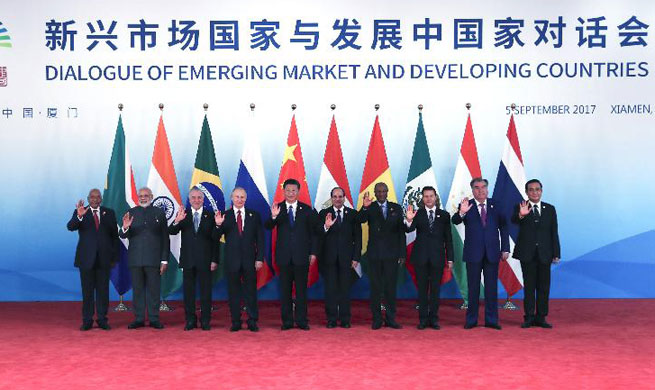BERLIN, Sept. 4 (Xinhua) -- Eastern and Western Germany remain economically divided 27 years after their re-unification, an official report approved on Wednesday by the German Federal Government finds.
Although the differences between the two halves of the country have continued to decline since 1990, the average gap in output in 2016 was still 27 percent. Excluding the relatively-prosperous Berlin, the disparity would have been even higher at 32 percent.
"Germany's strong position in Europe and the wider world regularly overshadows its domestic tensions back home," Michael Broening, policy expert at the think-tank "Friedrich Ebert Stiftung" (FES), told Xinhua on the subject.
"From an economic perspective, there is not one Germany but two," he added.
The unemployment rate in Eastern Germany more than halved from an annual average of 18.7 percent to 8.5 percent between 2005 and 2016, but the figure was still significantly higher than the 5.6 percent recorded in Western Germany last year. In 2016, communal tax revenue in Eastern Germany merely amounted to 60 percent on average of government income recorded in Western Germany.
Wednesday's report, formally titled the "Annual Report on the State of German Union", was compiled by the official government appointee for Germany's new states Iris Gleicke (SPD). She noted that the pace of convergence between West and East had "slowed significantly" in the past decades.
While Gross Domestic Product (GDP) per capita rose from 34,000 to 39,000 euros per year in Western Germany, the comparable figure for Eastern Germany was still below 29,000 euros.
FES expert Broening warned that progress on economic convergence was now occurring at a "glacial" pace. As a consequence, German lawmakers were confronted with a problem which was not just socio-economic and demographic in nature, but also had a political dimension ahead of federal elections on Sept. 24.
According to Broening, it was no coincidence that extreme political positions were particularly popular in economically-depraved parts of Eastern Germany.
The Federal Government acknowledged this link in its report and voiced concern that globalization and demographic change could lead to a further intensify regional disparities. "Societal tensions and even radical attitudes can develop in weaker regions in which people feel left-behind," Gleicke cautioned.
The official report identifies a lack of large businesses amid relatively-small scale of commercial organizations in Eastern Germany as a major cause for the prevailing differences. The Federal Government pointed out that not a single Eastern German firm was listed on the blue-chip DAX stock exchange in Frankfurt.
Eastern Germany is also worse affected by demographic change than the Western half of the country with a population which is shrinking and ageing rapidly. Annual population growth of 1 percent due to migration between 2014 and 2015 was unable to offset a 15 percent decline to a total of 12.6 million inhabitants from 1990 until 2015.
In light of the prevailing gap between the East and West, regional balancing mechanisms such as subsidies therefore continued to be necessary as a contribution to German social cohesion. The goal of the Federal Government was to ultimately achieve "equal life conditions" in all of Germany.
Although that objective was still a long way off, Gleicke argued that the process of unification was a "success story" overall. Eastern Germans could be proud of the strides they had already taken on the "path to the completion of the German union."
Such progress was reflected in study findings that Eastern Germans held a more positive view of their lives than was previously the case. The report hereby referred to surveys conducted by the German Institute for Economic Research (Deutsches Institut fuer Wirtschaftsforschung, DIW) which showed that Eastern Germans rated their happiness at 7.3 on a scale from 0 (least happy) to 10 (very happy) in 2015. This figure compared to an older reading of 6.3 percent in 1991 and a Western German average of 7.6 in 2015.
Nevertheless, Reiner Haseloff, governor of the Eastern state of Saxony-Anhalt, demanded that the former Communist parts of Germany continue to receive financial support in reaction to the report.
"Germany as a whole and the European Union have a responsibility to promote the East's developmental prospects and hasten the convergence process with the West," he said.

















